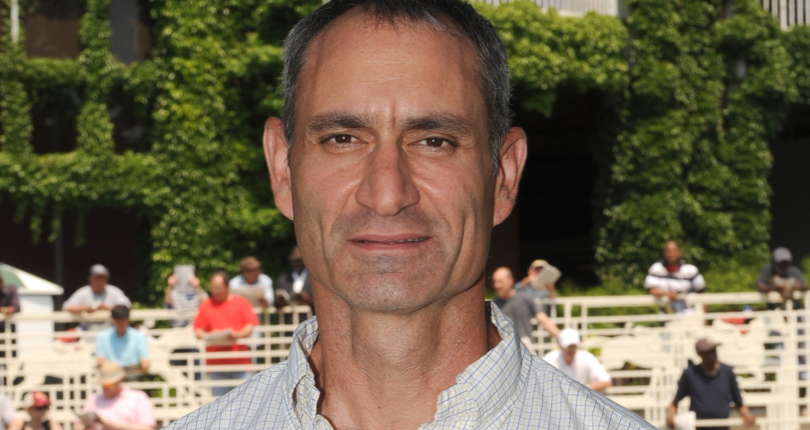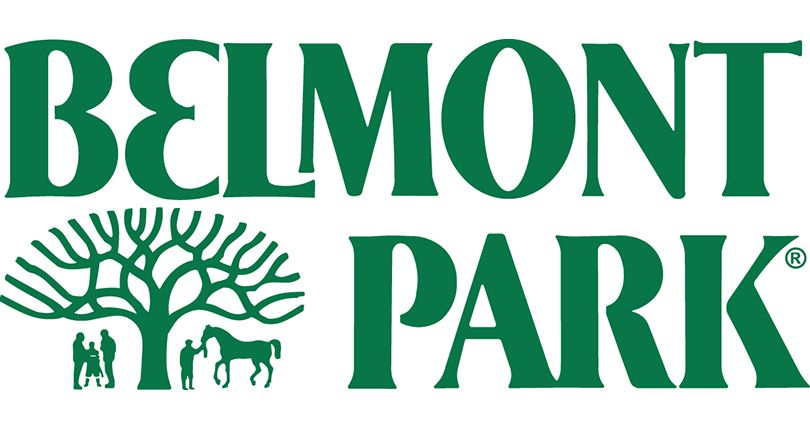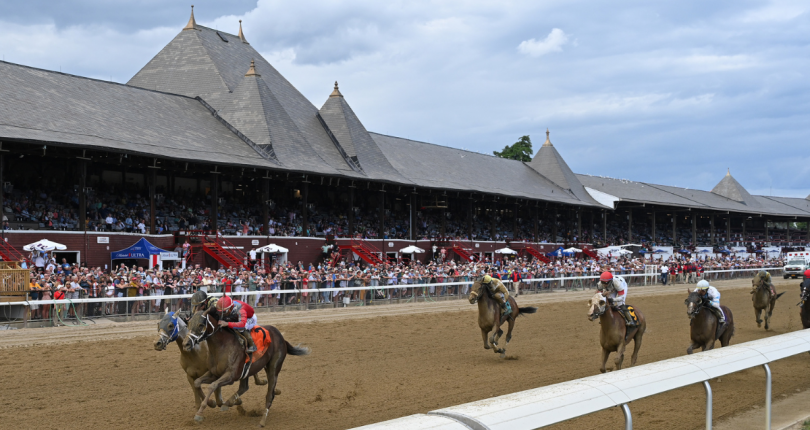
Schosberg on training horses and staying healthy at Belmont Park
by NYRA Press Office
Live racing on the New York Racing Association, Inc. (NYRA) circuit is currently on hold, but more than 1300 horses continue to train at Belmont Park.
Veteran trainer Rick Schosberg, who conditioned champion Maria's Mon and multiple Grade 1-winner Affirmed Success, is one of the many horsemen plying their trade at Belmont while awaiting the opportunity to restart the Aqueduct meet postponed due to changing circumstances in the racing community relative to the coronavirus (COVID-19).
Schosberg said he is working diligently to protect himself and his fellow horsemen while providing important and essential care each day for his horses.
"To borrow a phrase from the late Rick Violette: this is heart attack serious," said Schosberg in reference to the longtime NYRA horseman and former president of the New York Thoroughbred Horsemen's Association (NYTHA) who passed away in October 2018.
"The main thing is to maintain your health. If you get sick or your staff get sick, the business will suffer," said Schosberg. "You have to do everything you can to mitigate the risk of spreading the coronavirus. Stay away from each other and don't take offense if I walk away - I can hear you from 20 feet away. That's the key to getting out of this."
A Preparedness and Response Plan Committee, comprised of key NYRA staff members as well as representatives from NYTHA, the Backstretch Employee Service Team (BEST), and the New York Race Track Chaplaincy of America (NYRTCA), have closely monitored and assessed developments regarding the coronavirus for the past several weeks to develop key protocols to monitor and manage both the Aqueduct and Belmont properties.
The committee has posted coronavirus related signage in English and Spanish across the backstretch, which is home to 550 workers, and closed the recreation center to encourage social distancing. In addition, both the Morning Line café and track kitchen are providing grab-and-go food options to align with guidance from the New York State Department of Health.
"There have been a number of productive meetings and phone calls as part of a group effort with NYTHA, BEST and the Chaplaincy to keep things running smoothly," said Schosberg, a member of NYTHA's board of directors. "At my barn, we have different kinds of sanitizers, Clorox bleach products, and disposable surgical gloves for the employees. It's tough to get masks, so we make sure not to ever have more than one person in a stall at a time.
"We also wipe down common surfaces," he added. "Our business is a little different than an office setting with keyboards and a desk. We have rakes, pitch forks, brooms, buckets, wall boxes and we spray them down with a bleach product throughout the morning. We clean the lead shanks and try to do everything we can to mitigate the risk as best as possible."
Schosberg, who graduated from Cornell University in 1984 with a degree in applied economics concentrating on animal science and equine studies, said clear communication is key to stemming the spread of the coronavirus.
BEST is currently directing backstretch workers feeling symptoms of the coronavirus, or in need of other care, to contact the Elmont Health Center, located across the street from Gate 5 at 161 Hempstead Turnpike. Backstretch workers are asked to call the Elmont Health Center [516-571-8200], a Federally Qualified Health Center, in advance before heading to the clinic.
"It's a matter of getting your employees to grasp the seriousness of the situation and letting them know if they don't feel well to make the phone call and let someone know," said Schosberg.
On Friday, New York Governor Andrew M. Cuomo signed an executive order mandating businesses that rely on in-office personnel to decrease their workforce by 100 percent. But while business stops across New York State, the executive order provides additional, specific justification regarding jobs that are exempt from this order, including those connected to the stabling and training operations at Belmont.
"In New York State, there's an essential services mandate for people leaving their house and animal services falls under essential services," said Schosberg. "But we have a responsibility to allow people to stay home if they want to and make sure that people can stay home if they need to. We don't need to overstaff right now. We're not racing and training is limited to six days a week."
NYRA announced on Friday that training would be conducted six-days-a-week, Monday through Saturday, beginning March 29 at Belmont as the first step in a process to ensure that training can continue safely at the Elmont track.
"NYTHA and NYRA worked on the logistics and details with a committee of trainers to agree to one day off," said Schosberg. "It gives people a chance to be with their families. It's a good compromise between NYTHA and NYRA and it keeps moving the ball down the field as we look to work towards long-term goals.
"We want to keep horses here so that inevitably, when we re-open, we have a product with horses that are fit and healthy and ready to race safely."
Horsemen are notorious for their resiliency and work ethic, which Schosberg said is a necessity in his line of work.
"People that work with livestock or agriculture have a work ethic of plowing through just about anything," said Schosberg. "We have to deal with so many variables, like weather, that can bring productivity to a grinding halt. As a group, we're looking to get through this and be viable. We want to get back to where we were before the coronavirus. I know it will take time, sacrifice and effort to attain that goal."
Adjusting to the new normal of training horses in these uncertain times takes its toll financially, physically and mentally. Schosberg said it's important for his colleagues to find a few quiet moments in each day to recharge for the lengthy battle ahead.
"I have two dogs and we make the rounds a couple times a day," said Schosberg. "You have to take a little time out and try not to think about it for a few minutes or your productivity may decrease. You have to realize that you're a human being and there are limitations. Losing sleep and worrying throughout the day and maybe causing relationships to deteriorate is not healthy."
Schosberg may take his moments but he is also extraordinarily busy as the Chair of NYTHA's Aftercare Committee, and he oversees the TAKE THE LEAD Thoroughbred Retirement Program (TTL), which finds new homes at Thoroughbred Aftercare Alliance (TAA) facilities for horses retiring from NYRA tracks.
The NYRA and its horsemen are committed supporters of the TAA, which accredits, inspects, and awards grants to approved aftercare organizations to retrain, retire, and rehome Thoroughbreds using industry-wide funding.
One of NYRA's recent avenues of support for the TAA was created in collaboration with NYTHA. With the start of the 2019 Saratoga Race Course meet, NYRA began placing a 1.5 percent assessment fee on all claimed horses at its tracks with the proceeds going to the TAA and the NYTHA-administrated retirement program, TAKE THE LEAD.
"We've moved about three or four horses in the last week and we have a list of candidates on the grounds," said Schosberg. "That process hasn't stopped at all We're able to get horses loaded up and on their way as long as shipping companies are running for us."
Schosberg said he estimated having retired 120 horses since June 2019 via the TTL program which provides preliminary vet exams and treatment, as well as costs related to transportation and rehabilitation or retraining.
"The program is working wonderfully," said Schosberg. "When there's openings at TAA facilities, they let us know right away and we take care of the cost of shipping."
Schosberg said donations to the TTL's Take2 Second Career Thoroughbred Program are always welcome.
"We've made sure were funded for the full fiscal year with regard to the TTL program, but without racing a lot of the revenue for the program will come to a halt," said Schosberg. "The aftercare per start program and claiming assessment fee dries up, so if people want to donate, please visit the Take2 site. And, of course, any donations to Racetrack Chaplaincy, Belmont Child Care Association and BEST are always helpful for the community."
For more information about Take2 Thoroughbreds, please visit https://www.take2tbreds.com/make-a-donation/.






 Gambling Problems? The New York Racing Association encourages responsible wagering. If gambling is a problem for you or someone you care about, help is available 24 hours a day. Scan here to talk with someone now about your gambling. Or call toll-free 1-877-8-HOPE-NY.
Gambling Problems? The New York Racing Association encourages responsible wagering. If gambling is a problem for you or someone you care about, help is available 24 hours a day. Scan here to talk with someone now about your gambling. Or call toll-free 1-877-8-HOPE-NY.